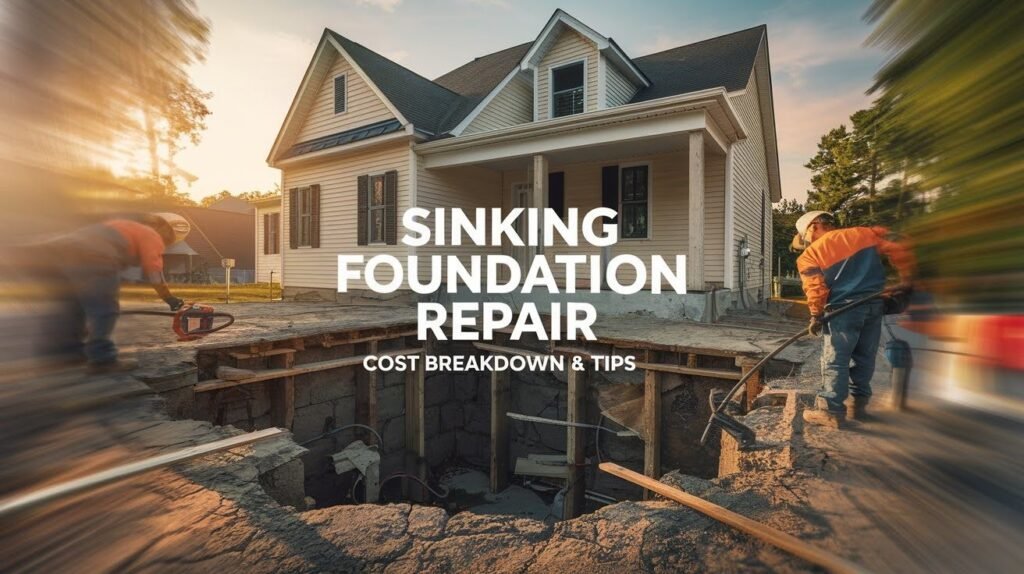Your foundation is sinking. You need real numbers, not sales talk.
You’ll learn what makes foundations sink, how to spot trouble, and what each repair really costs. I’ll tell you about the extra costs most contractors don’t mention.
You’ll also learn how to save money without cutting corners. I’ll share a real story from Austin, Texas, with actual costs. No confusing jargon. No inflated prices. Just honest answers from someone who’s seen it all.
When you finish reading, you’ll know what to expect and how to protect your home. Your foundation worries end here.
What Makes a Foundation Sink?
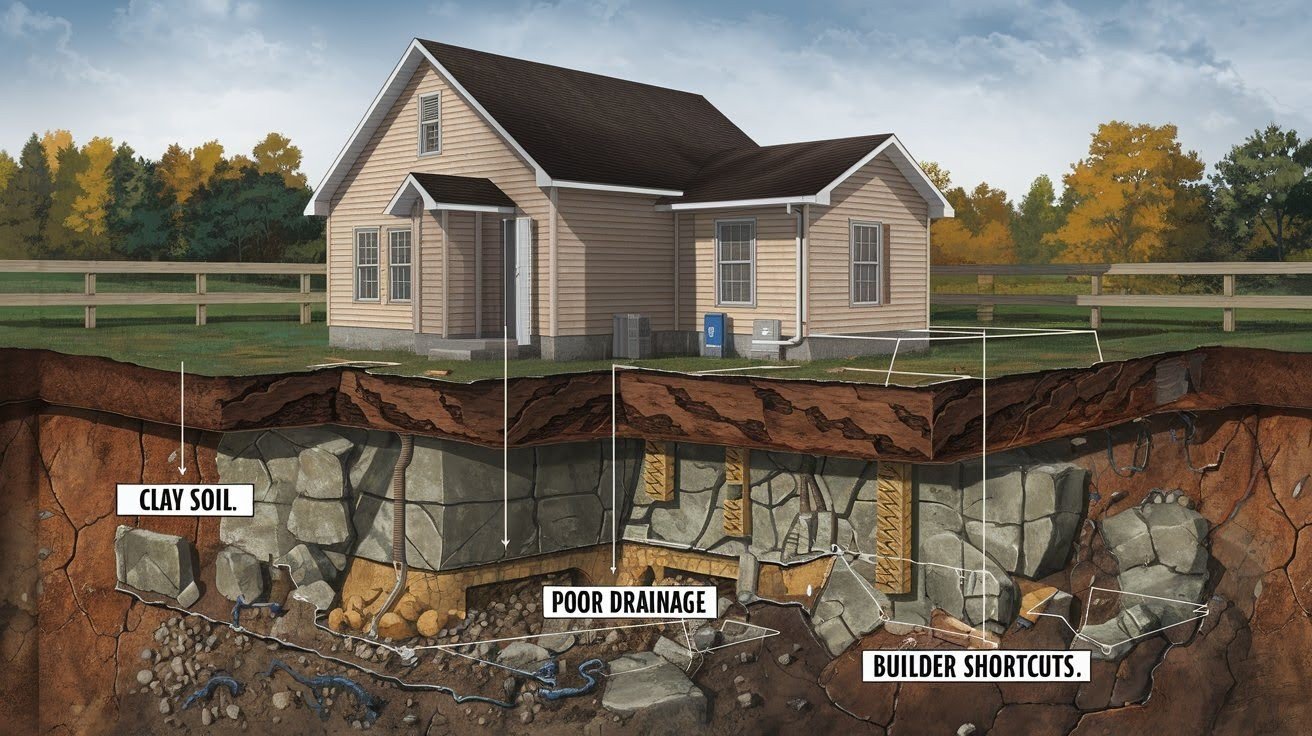
Most people think foundations sink overnight. That’s wrong. Your foundation has been slowly sinking for months or years.
Here’s what’s happening under your house:
Soil Problems
Clay soil causes the most trouble. When it gets wet, clay grows bigger. When it dries out, it shrinks. This back-and-forth creates empty spaces under your foundation. Your house slowly sinks into these gaps.
Water Problems
- Bad drainage around your house
- Leaky pipes washing dirt away
- Yard slopes toward your foundation
- Gutters overflowing near your house
Builder Shortcuts
Some builders take shortcuts. They might:
- Skip packing the soil properly
- Use cheap foundation materials
- Skip drainage systems
- Rush the concrete work
Normal Settling
All houses settle a little over time. But too much settling means trouble.
Normal: 1-2 inches over several years Problem: More than 2 inches or fast movement
Signs Your Foundation Is Sinking
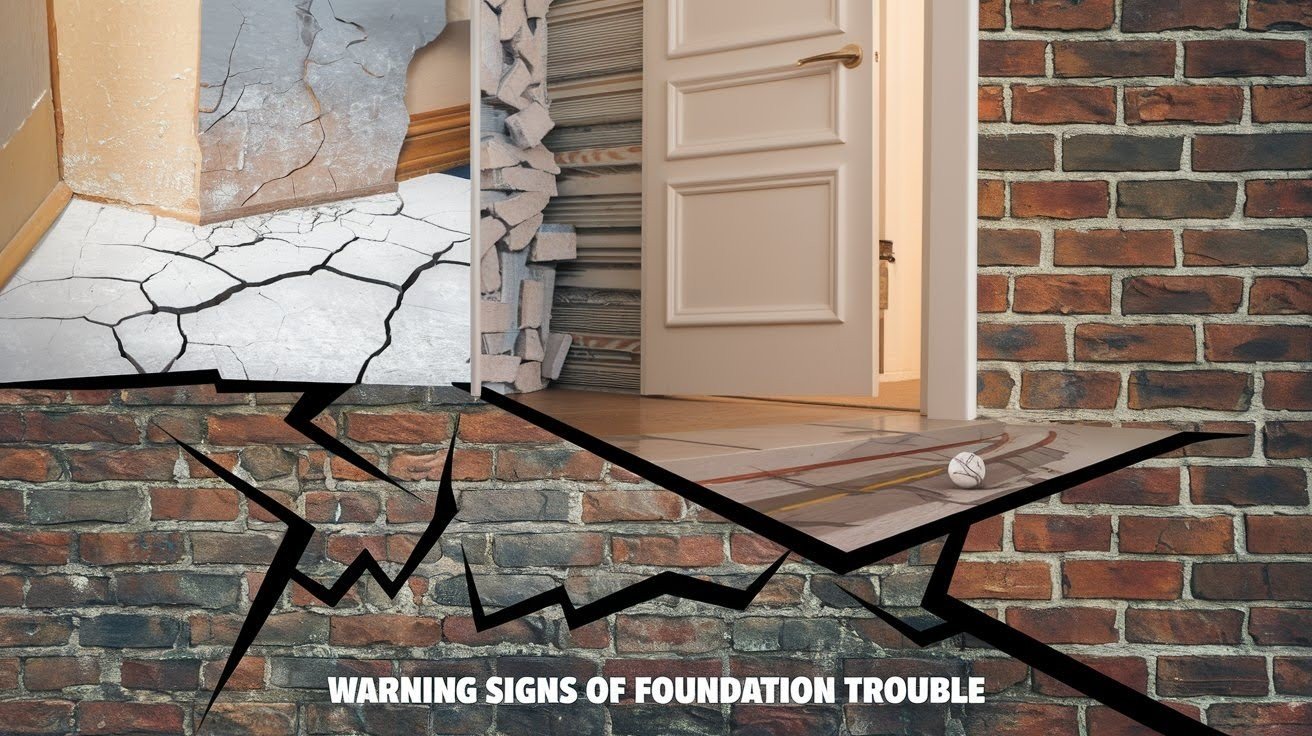
You don’t need to be an expert to spot these problems.
Inside Your House
Doors that won’t close right. This is usually the first thing homeowners notice.
Cracks in walls or ceilings. Look for:
- Zigzag cracks in brick
- Straight cracks in drywall
- Cracks that keep getting bigger
Floors that aren’t level. Roll a marble across your floor. If it always rolls to the same spot, you have a problem. Windows that stick. When your foundation sinks, it pulls your window frames crooked.
Outside Your House
Cracks you can see in your foundation:
- Straight cracks wider than a quarter-inch
- Zigzag cracks in brick
- Cracks big enough to stick a coin in
Gaps between your foundation and walls. You shouldn’t see light between these. Chimneys or porches that lean. These heavy parts sink faster than your main foundation.
Here’s what most people miss:
The Hidden Signs
Higher electric bills. Gaps in your foundation let air escape. Musty smells. Sinking foundations often cause water problems. Bug problems. Bugs and mice get in through foundation gaps.
Types of Foundation Repairs
Not all foundation fixes are the same. The right method depends on your problem and your soil.
Push Piers (Most Common)
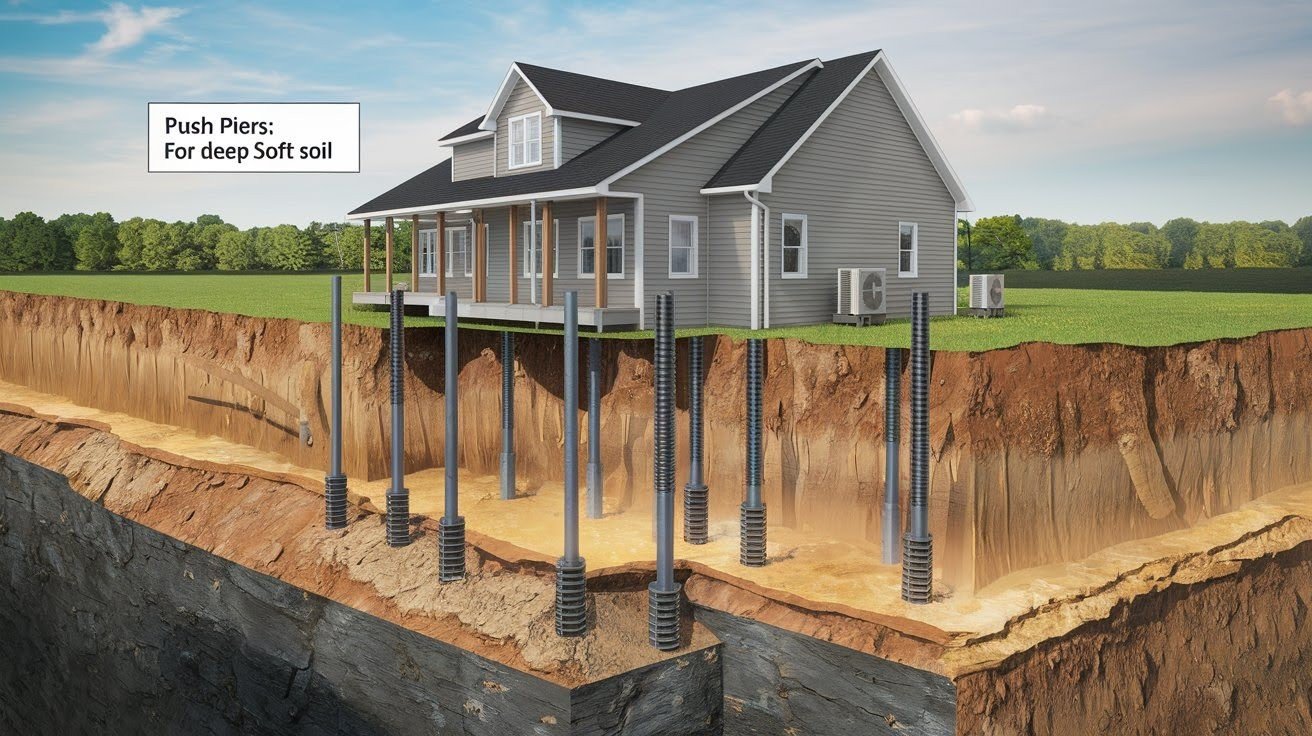
Steel tubes pushed deep into solid ground. They move your house’s weight to stable soil below.
- Best for: Houses with deep, soft soil
- Time needed: 1-3 days
- How disruptive: Medium
Helical Piers
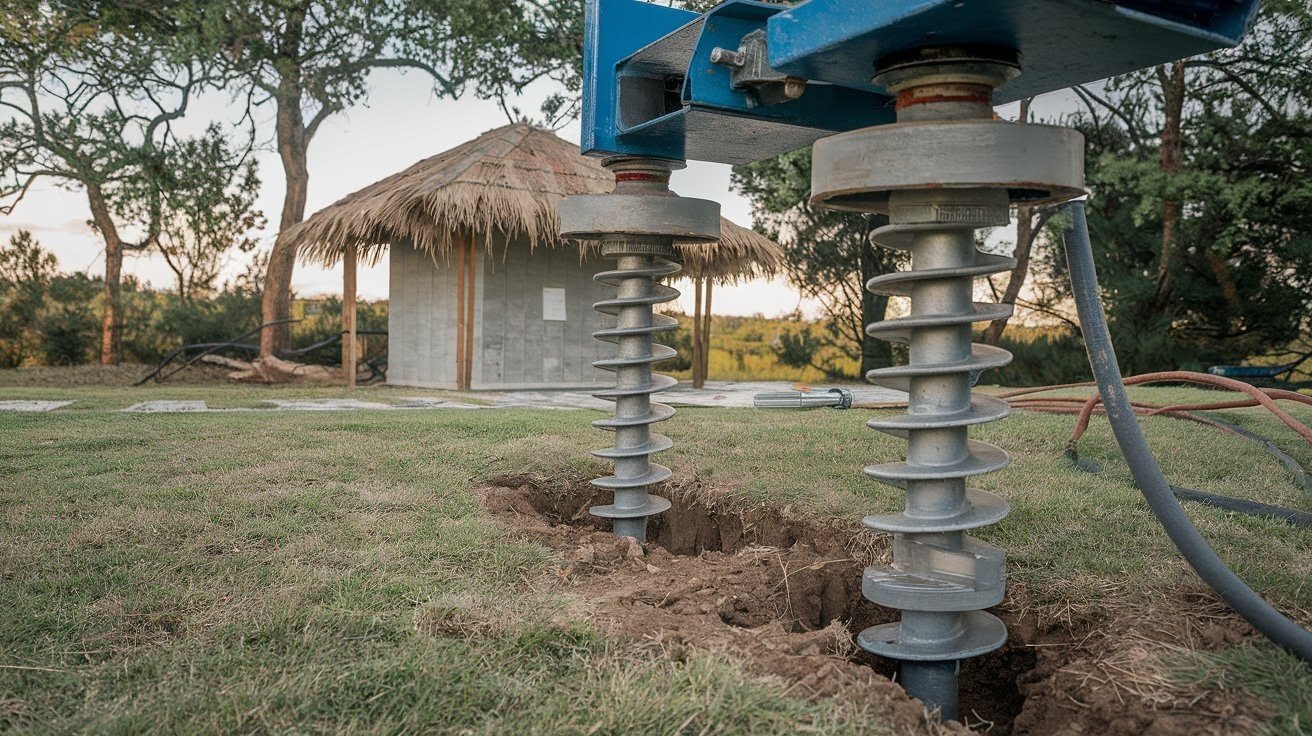
Screw-shaped steel posts twisted into the ground. Think of giant screws holding up your house.
- Best for: Lighter buildings or tight spaces
- Time needed: 1-2 days
- How disruptive: Low
Slab Jacking
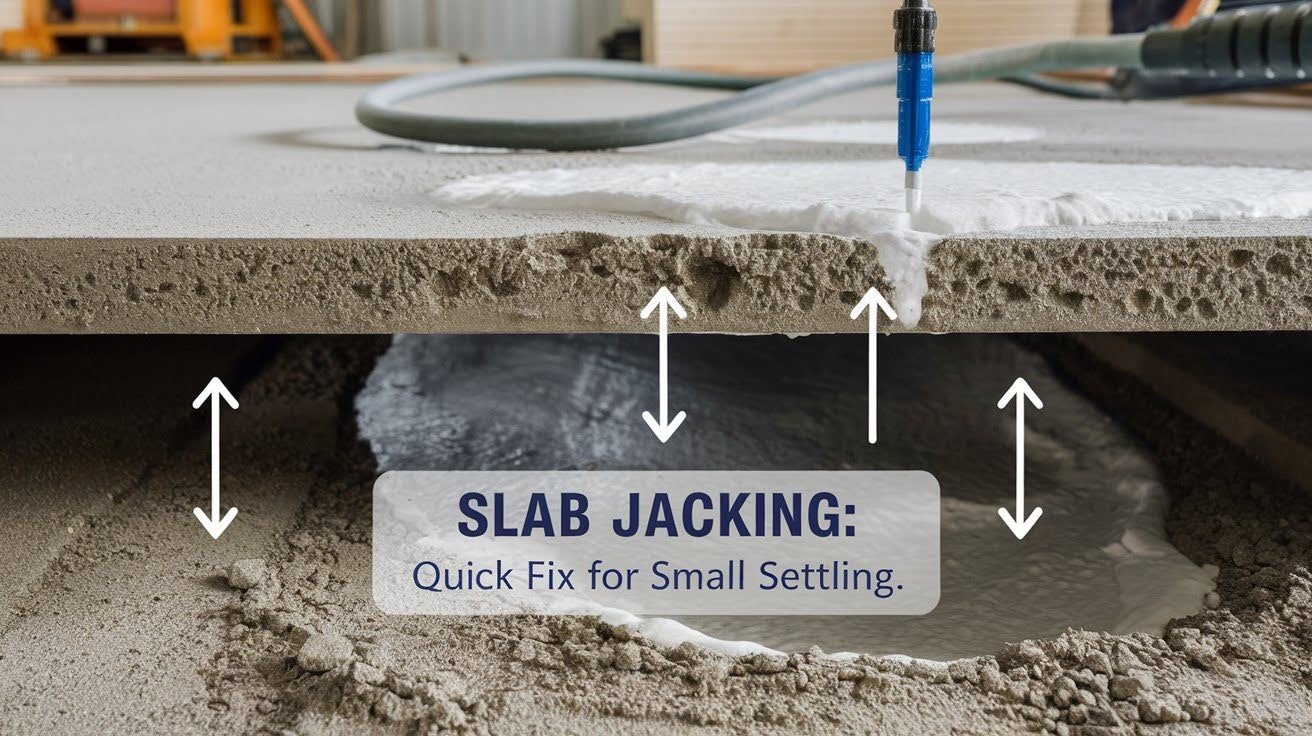
Concrete or foam pumped under your foundation to lift it up.
- Best for: Small settling problems (less than 2 inches)
- Time needed: 1 day
- How disruptive: Very low
Underpinning
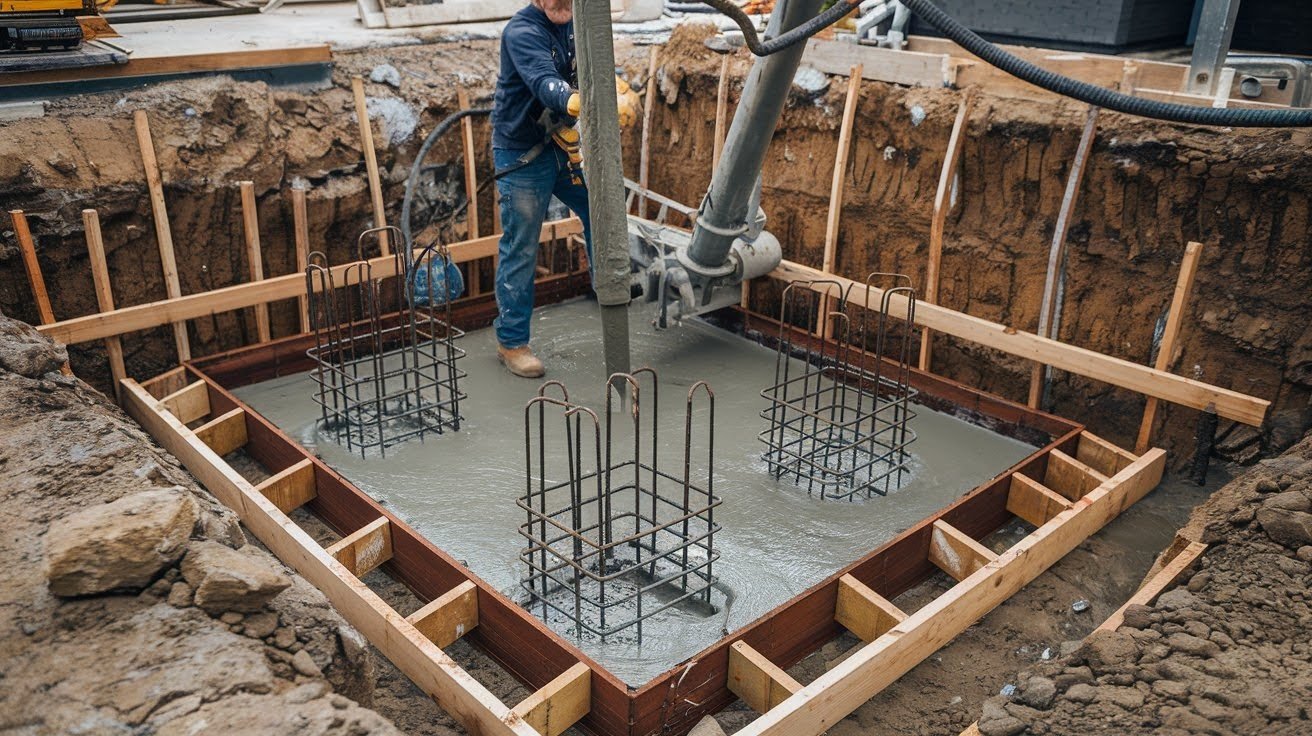
New concrete footings poured under your old foundation.
- Best for: Bad structural damage
- Time needed: 1-2 weeks
- How disruptive: High
Truth: Most contractors try to sell you the most expensive fix. Get several opinions.
What Foundation Repair Really Costs
Here’s what you’ll actually pay in 2025. These numbers come from real jobs.
Push Piers: $1,200 – $1,800 each
Most houses need: 6-12 piers Total cost: $7,200 – $21,600
What changes the price:
- How deep they have to go
- How many you need
- How easy it is to reach your foundation
- Local worker costs
Helical Piers: $1,100 – $1,500 each
Most houses need: 8-15 piers Total cost: $8,800 – $22,500
Slab Jacking: $500 – $1,200 per section
Most jobs: 3-6 sections Total cost: $1,500 – $7,200
Underpinning: $15,000 – $40,000+
This is major work for your foundation. Only needed in bad cases.
Different Areas Cost Different Amounts
- Texas: 15-20% more than average (clay soil problems)
- California: 25-30% more (earthquake rules)
- Florida: 10-15% more (sandy soil problems)
- Midwest: 5-10% less (stable soil)
Hidden Costs Most People Don’t Know About
The repair quote is just the start. Here’s what contractors don’t tell you:
Permits & Inspections: $200 – $800
Most places require permits for foundation work. Don’t skip this. Work without permits can hurt your home’s value.
Soil Testing: $500 – $1,500
You need this to pick the right repair. Skipping this often means the repair fails.
Drainage Fixes: $2,000 – $8,000
Without good drainage, your foundation will sink again.
This might include:
- French drains
- Fixing yard slopes
- Gutter repairs
- Waterproofing
Fixing What Looks Bad: $1,000 – $5,000
After foundation repairs, you’ll need to fix:
- Cracked walls
- Doors and windows that stick
- Damaged floors
- Outside cracks
Staying Somewhere Else
Big repairs might mean you can’t stay home. Plan for:
- Hotel costs
- Storage costs
- Eating out more
The Real Total
Most homeowners spend 20-30% more than their first quote when everything’s done.
Should You Fix It Yourself?
I’ll be honest: foundation repair is not a do-it-yourself job.
But you can do some things yourself:
Things You Can Do
Fix drainage around your house:
- Clean gutters and downspouts
- Make downspouts go away from your foundation
- Fix yard slopes
- Seal small cracks
Money saved: $500 – $2,000
Things You Should Never Do Yourself
Structural repairs. Here’s why:
- Safety risks: Wrong work can make problems worse
- Building rules: Most places need licensed contractors
- Insurance problems: DIY repairs often cancel warranties
- Selling problems: Buyers want professional work
The “Partial DIY” Way
Do your homework first:
- Get several quotes
- Research contractors well
- Do the prep work yourself
- Watch the project closely
This can save you 10-15% on total costs.
How to Save Money on Foundation Repair
When You Do It Matters
- Best time to repair: Late fall through early spring
- Why: Contractors aren’t as busy and will negotiate
- Avoid: Summer months when everyone wants work done
Get Several Quotes (The Right Way)
Don’t just collect quotes. Here’s the smart way:
- Get 3-5 prices from different contractors
- Ask specific questions about their methods
- Check references from recent jobs
- Make sure they’re licensed and insured
- Compare warranties carefully
How to Negotiate
What contractors will negotiate:
- Payment terms
- When the work gets done
- Longer warranties
- Doing multiple jobs together
What they won’t negotiate:
- Material costs
- Permits and inspections
- Emergency repairs
Ways to Pay
- Home equity loan: Lowest interest rates
- Personal loan: Faster approval
- Contractor financing: Often 0% for qualified buyers
- Insurance claims: Worth checking for sudden damage
Money-Saving Tips
Bundle related work. If you need drainage fixes, do them with foundation repairs. Time it with other jobs. Do it with landscaping or outside work.
Ask about warranty transfers. Some warranties go to new homeowners.
Real Story – Before & After Foundation Repair
Let me tell you about a real job I worked on in Austin, Texas.
What Happened
Homeowner: Sarah M., 1,800 sq ft ranch house built in 1995
Problem: Foundation sinking 3 inches on one corner
What she saw: Doors wouldn’t close, big cracks in brick outside
What We Found
Soil test results: Clay soil going down 8 feet
What we recommended: Push piers with drainage fixes
How long: 2 weeks total work
What It Cost
Foundation repair: $14,200 (9 push piers)
Drainage system: $3,800 Permits: $400
Cosmetic fixes: $2,100 Total cost: $20,500
How We Did It
Week 1: Digging and putting in piers
Week 2: Drainage work and fixing the yard
Later: Cosmetic repairs 2 weeks after
What Happened
Foundation level: Within 1/4 inch of where it should be
Doors and windows: All working right
Cracks: Fixed and watched
Warranty: 25 years
What Sarah Says
“I wish I’d fixed the drainage problems earlier. The foundation repair was needed, but I could have prevented it with better drainage.”
Total time from first problems to done: 6 months
Home value change: Went up about $15,000
One Year Later
No new sinking All repairs still good Lower electric bills Peace of mind, Worth everything.
Conclusion
Foundation repair costs range from $1,500 for small slab jacking jobs to $40,000+ for major underpinning work. Most homeowners spend $8,000 to $22,000 for typical pier systems. The real cost of waiting is much higher.
Every month you wait makes the problem worse and more expensive to fix.
Get a professional to look at it as soon as you notice problems. Fixing it early almost always costs less than waiting. Don’t get three quotes and pick the cheapest. Get three quotes and pick the contractor who explains the problem best.
Remember: A solid foundation protects your family’s safety and your biggest investment. Foundation problems stress your whole family.
You now know what you need to make good decisions. Act fast, do your research, and choose well. Your home’s future depends on what you decide today.
Frequently Asked Questions
How long does foundation repair take?
Most foundation repairs take 1-3 days for the actual work. But the whole process from start to finish usually takes 2-4 weeks because of permits, scheduling, and follow-up work.
Will my insurance pay for foundation repair?
Insurance usually covers foundation damage from sudden things like burst pipes or storms. Slow settling from soil movement or bad drainage usually isn’t covered.
Can I stay in my house during repair?
Yes, most foundation repairs let you stay home. You’ll hear noise and see equipment, but the work happens outside and in crawl spaces or basements.
How long do foundation repairs last?
Professional foundation repairs with push piers or helical piers usually last 25-30 years or longer. The warranty is usually 10-25 years depending on the contractor and method.
What happens if I ignore a sinking foundation?
Ignoring foundation problems leads to more expensive repairs, structural damage, and safety problems. The average cost goes up 15-20% for every year you wait.


